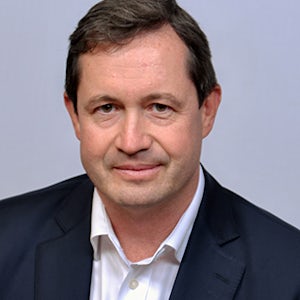Joseph Neuhaus
Thank you very much. Let’s move to the program. First, we will start with a tribute to one of the giants of our community, that we lost this year: Emmanuel Gaillard.
We have asked two of Emmanuel’s longtime colleagues and friends to speak briefly about him. Philippe Pinsolle, a partner at Quinn Emanuel Urquhart & Sullivan LLP in Geneva, and Yas Banifatemi, a partner at a brand-new law firm that she and Emmanuel had just launched.
Philippe Pinsolle
Thank you, Joseph. What I am going to do is not easy, even with the passage of time. I will do my best. The death of Emmanuel reminded us that genius is no guarantee for eternity. Actually, if you look at history, it is probably the opposite. I need not remind you of his contribution to the theory of arbitration. Emmanuel was not discussing cooking recipes. He was not discussing whether you need one or two post-hearing briefs. He was not even discussing the kitchen or the restaurant. He was planning the city within the world. He was the architect of arbitration as a system as we know it. And his contribution was immense, and it will be here for decades. I need not remind you either, that he was a genial litigator. The kind of which could smell blood from a distance. The kind of which could go to the jugular and kill you in a matter of minutes, real smart.
But I would like to insist on another aspect of his personality. Emmanuel was a human being, profoundly human. He was simple. He was approachable. And he was funny more than anything else. He was impertinent in a novel sense of that word. A quality which may be lost today.
Working with Emmanuel was a privilege. Being in arbitration with him was immensely funny. I will just tell you an anecdote and then you can think about it. We were in this case where three very famous arbitrators, a bit sleepy, were listening to us. And he looks at them and the secretary of the tribunal and, during the break, he went to the opposing counsel and told them: “look, you see the secretary of this tribunal? He is not the fourth arbitrator. He is the sole arbitrator”. And he was right, in that particular case. That is the kind of thing we would enjoy when working with Emmanuel.
That is something which I enjoyed for almost 20 years, and I am immensely grateful for that. And everything that I have done in the business derives, one way or another, from what I learned, from what he taught me. With this, I would like to give the floor to my former partner and friend. Yas will give you another view of Emmanuel and please remember him. Thank you for your time.
Yas Banifatemi
Thank you, Phillipe. Good day everyone. What I have to say is very similar to what Phillipe just said. In fact, because we have the same experience and the same approach to Emmanuel.
I will start by saying what Emmanuel liked to say: “a good theory is always practical.” He was an incredibly powerful and visionary theorist with a fertile thinking spreading over a period of 40 years, starting with his PhD dissertation on the concept of power in private law, to a seminal legal theory on international arbitration based on his 2007 course at the Hague Academy,1The Hague Academy of International Law, 2007 Summer course.1 to his last articles calling for arbitrators to exercise courage in their assessment of corruption.2See, e.g., Emmanuel Gaillard, The emergence of transnational responses to corruption in international arbitration, 35(1) ARB. INT’L 1, 19 (2019); Emmanuel Gaillard, La corruption saisie par les arbitres du commerce international, 2017(3) Revue de l’arbitrage, 805, 838 (2017).2 At his very last webinar, which gathered over 1,000 persons, and during which he provided a masterful analysis of seven dirty tricks,3American University Washington College of Law 2020 Annual Lecture on International Commercial Arbitration: “Seven Dirty Tricks to Disrupt Arbitral Proceedings and the Responses of International Arbitration Law”, held virtually on September 24, 2020, available at https://www.youtube.com/watch?v=l8RF9Xq_MQY.3 he left us with what I considered to be a very small part of his testament to the international arbitration world: that the arbitral system is able to deal appropriately with party obstruction that are at the margins, but in order to avoid that abusive conduct from spreading and infecting the entire system, we need to develop substantive rules of international arbitration.
Emmanuel was also a magnificent practitioner, as Phillipe just mentioned. A lot has been said on his charisma and strong courtroom presence. I personally have vivid memories of historic cross-examinations and oral arguments over the 24 years of working with him, and his clients’ admiration and devotion to him showed how much they counted on him to save the day.
As his co-teacher over the past few years, I cannot emphasize enough his footprints with the students. One of our former Yale students, an American Yale student, told me that what gave him reassurance was “the cultivation of generations of inspired lawyers and students, and perhaps the fact that his legacy will live on.”
Above all, Emmanuel was an extraordinary human being, colleague, mentor, and friend. Hundreds of tributes were received from around the world at Gaillard Banifatemi Shelbaya Disputes, the firm which we established only six weeks before his unexpected passing. That gave him the excitement and delight of an institution created overnight in the body of a young start-up, which is what he liked to say. These tributes have unanimously saluted Emmanuel’s kindness, generosity, and simplicity, despite his remarkable stature.
We miss him tremendously every single day. We miss his laughter, his mischievousness, and his extraordinary energy and youth. We will continue to be guided by his light and our intent to pursue his work and legacy. Thank you very much.



